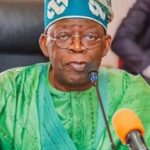The declaration of the 2023 Presidential election result by the Election Management body in Nigeria-INEC has added a new chapter to the nation’s history. After much anxiety, the contest was finally narrowed down to the Presidential Candidate All Progressive Congress-Asiwaju Ahmed Bola Tinubu. What is perhaps most remarkable about this historic election is not merely its significance for Nigeria’s democracy, but also how strongly ethnoreligious identity factored into the voting patterns.
In an era in which economics, security, and good governance are the key factors that shape voting behavior in other democracies, variances in religious or ethnic backgrounds have become more pronounced in the 2023 presidential election in Nigeria. This provided a case study of how powerful these harmful narratives can profile the future of democracy in Nigeria.
Read Also: 6 PRACTICAL STEPS TO CURB ETHNO-RELIGIOUS SENTIMENTS IN NIGERIAN PRESIDENTIAL ELECTIONS.
In a study conducted on the activities and performance of the 3 leading political parties and their Presidential candidates. The investigators examined a comprehensive report detailing party standings, electoral strategies, campaign effectiveness, and key talking points. This detailed report provides insight into which of the candidate outmatch others in using ethnoreligious sentiment to manipulate the electorates before the polls open.
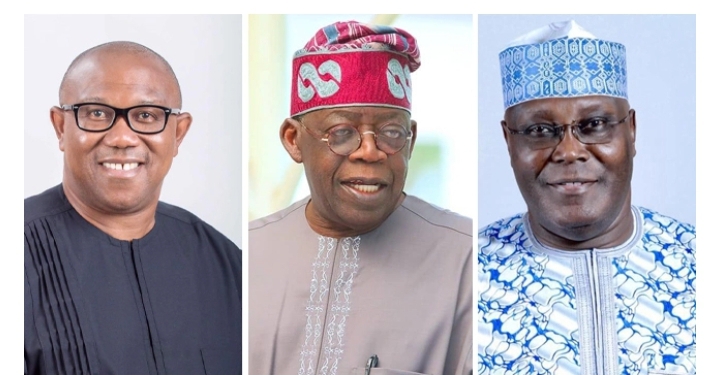
The Clustered Column Chart plotted in Fig 1 takes an exciting dive into the rate of ethnic sentimental support secured by the 3 leading presidential candidates. The 3 major ethnic groups are plotted on the X-axis, while the Y-axis shows the level of votes secured by the three leading presidential candidates through ethnic sentiment from the 3 major ethnic groups. Also, the colored bars represent how many millions each candidate earned in votes from each ethnic group.
Fig 1- Clustered Column Chart
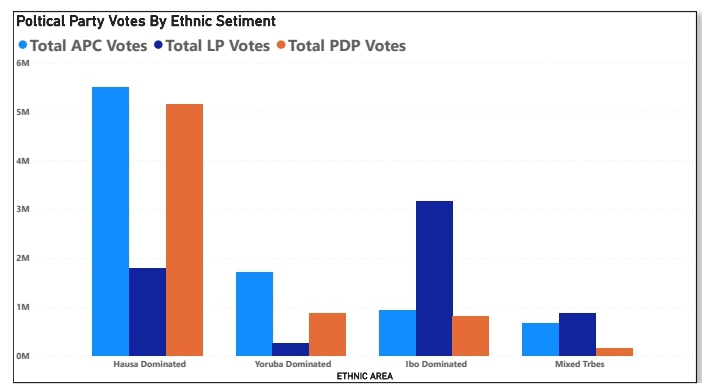
EphraimHill DC |Data Source: INEC, Nigeria, (2023)
This Clustered Column Chart clearly illustrates the inverse relationship between Total APC Votes and Total LP Votes.
- APC had927,327 of its Total Votes from Ibo Dominated Area
- While LP had 3,163,673 of its Total Votes from Ibo Dominated Area
- PDP had 808,916 of its Total Votes from Ibo Dominated Area
Obviously, at 3,163 673 votes, Ibo Dominated Areas, which was formerly a stronghold of the PDP in previous presidential elections now favored Labor Party significantly more than they did PDP with 808,916. However, APC managed to make an impressive showing by earning 927,327 votes from the same region. Despite the strong hostility for the ruling party in all regions resulting from its government’s anti-citizen monetary policies, APC was able to affirm its popularity across Nigeria’s diverse constituencies as a National Party.
Fig 2- Stacked Column Chart
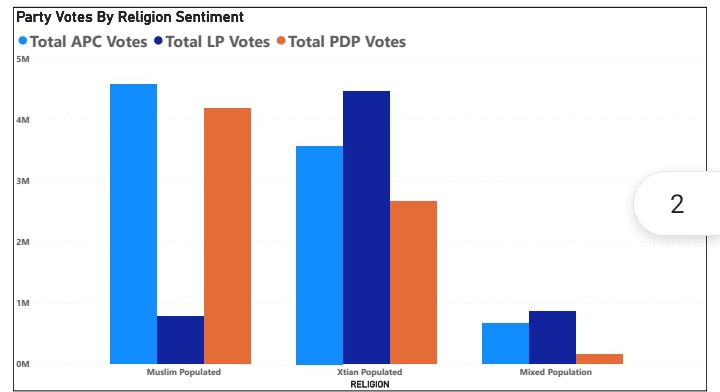
EphraimHill DC |Data Source: INEC, Nigeria, (2023)
The Stacked Column Chart in Fig 2 reveals a powerful insight into an inverse relationship between APC and LP votes in Christian-populated areas.
- APC had 3,569,838 of its Total Votes from Christian Populated Area
- While LP had 4,454,304 of its Total Votes from Christian Populated Area, which accounts for 73.13% of its total votes
- PDP had 2,655,644 of its Total Votes from Christian Populated Area
Although both APC and LP received an impressive number of votes of 3,569,838 and 4,454,304 from Christian-populated areas respectively – PDP saw a lower percentage with 2, 655 644 total votes amongst the Christian demographic. Specifically, 73.13% of all total Votes of the Labor Party were gotten from Christian Populated areas which far dwarf that of APC and PDP. This further proves the remarkable shift in voter trends that favors the Labor party across different Christian populations.
Fig 3: Basic Pie Chart
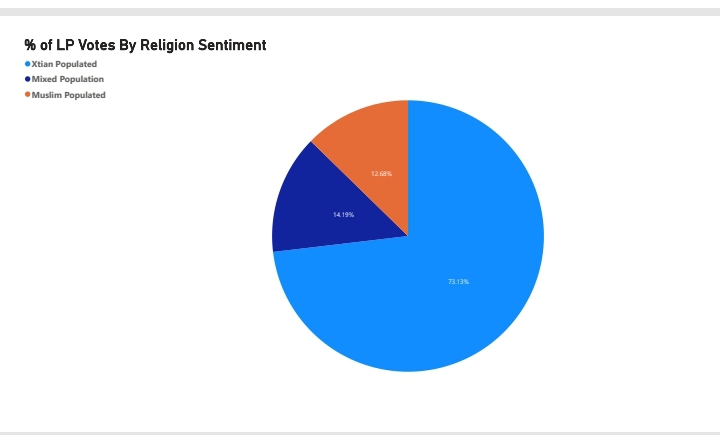
EphraimHill DC |Data Source: INEC, Nigeria, (2023)
The Basic Pie Chart in Fig 3 elaborates on the percentage of votes secured by the Labor Party through religious sentiment. The metrics correspond to the ranges of states populated by Christians, Muslims, and Mixed Religions. With an aggressive manipulation of religious sentiment to capture voters’ minds, it is no surprise that the Labor Party was able to score huge wins across states populated by Christians.
The Basic Pie Chart illustrates this perfectly with the sky blue shading part, which symbolizes a higher percentage of votes attained from Christian-populated areas; the brown shade represents Muslim-populated regions; while deep blue indicates support in corresponding mixed religion zones. The Basic Pie Chart illustrates how beliefs can sway electoral outcomes, as demonstrated by the percentage of sentiment votes attained from Christian-populated areas.
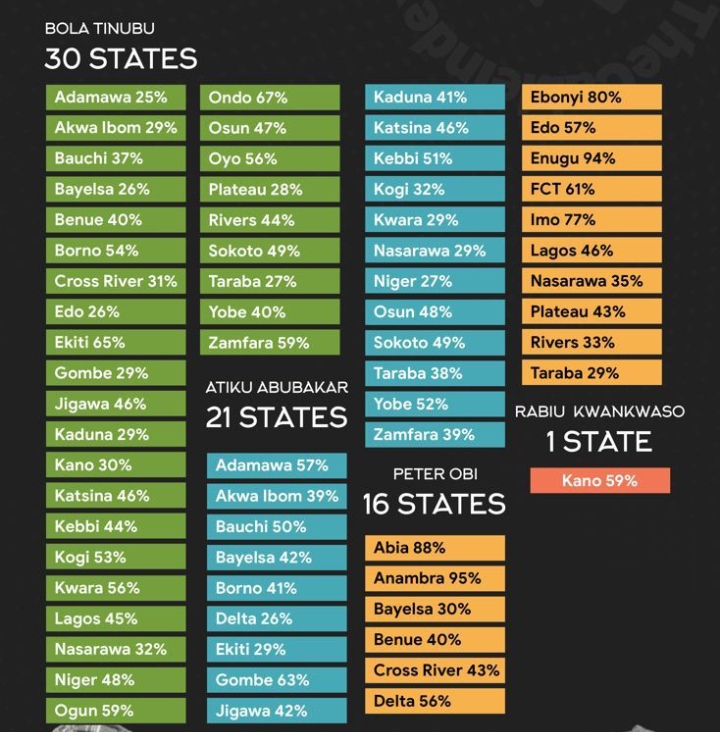
Undeniably, Religious sentiment earned the Labor Party‘s Presidential Candidate overwhelming support from Christian-populated areas – 73.13% of Counts of religious sentiment-induced votes across Christian-populated areas enfold his popularity–even coming first place in Plateau and Benue states where Christianity reigns supreme. Surprisingly, PDP’s home turf like Kaduna couldn’t keep the Labor Party from scoring big wins based on religious sentiment alone. Nonetheless, the party was not able to pick up much traction among Muslim-dominated states such as Kano, Sokoto, and so forth.
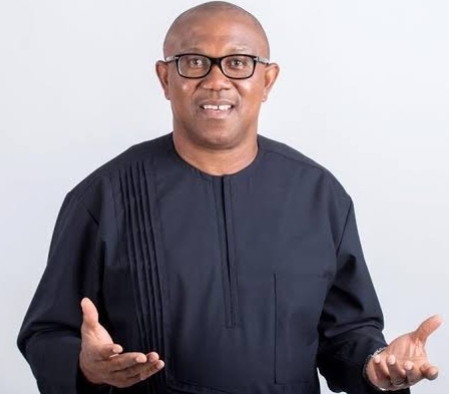
With the conclusion of voting and declaration of the total result, APC Presidential Candidate secured 37% of the total votes to become the President-Elect. The PDP and LP Candidates trailed slightly with 29% and 25% respectively.

REFLECTION
Nigeria’s 2023 presidential election results reveal an interesting picture of the nation – its citizens still recognize their ethnic and religious roots more than they prioritize economic growth or a unified vision for National integration.
Ahead of the February 25 election, desperate presidential candidates had stooped so low that they recruited clerics to inject religious divisions into the country. Religious influencers were twisted into forsaking their convictions and were used to create negative sentiments among believers. What a confounding move by the faith-based leaders to have agreed to set aside all morality for a possible yet uncertain victory at the polls instead of uniting the nation through justice and democracy.
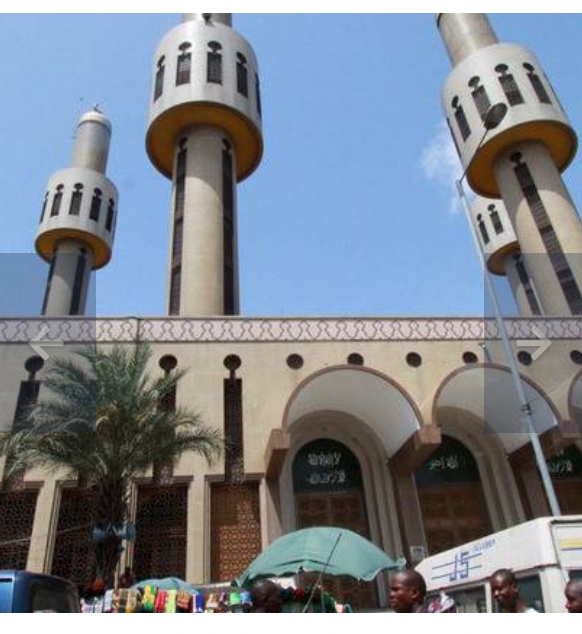
The Labor Party Candidate had cunningly stirred up divisions among multicultural and religious groups in Nigeria, leveraging their ethnic identity and faith to manipulate the electorate. He had craftily engaged Christian religious leaders to influence their devoted followers with persistent controversial messages and defamatory allegations against an unsubstantiated enemy of their faith – all to ensure the victory of a preferred candidate.
Read Also: THE ONLY WAY TO ENSURE A NEW NIGERIA
Our leaders of faith who are supposed to act as pillars that would deepen national unity and advance democracy have betrayed the faith in democracy by endorsing a candidate that only aims to exploit our religious sensibility for their gain. They have confounded Nigeria’s voting behavior which has now .taken a new approach in selecting its leaders, and the traditional values of religious leaders have also been altered.
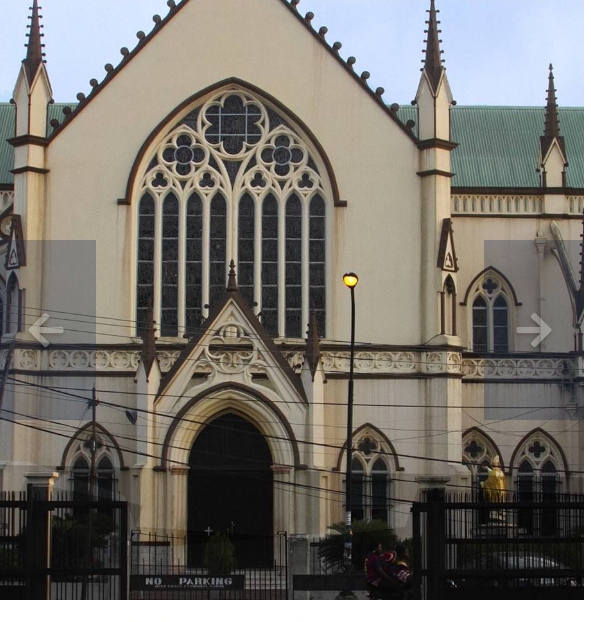
Nigeria’s election landscape is increasingly being dominated by ethnic and religious emotions, with the country becoming ever more divided. A manipulative candidate has capitalized on this vulnerability to secure support from a naïve electorate rather than promoting inter-nation unity; and this manipulative candidate has dangerously blended ethnic and religious preferences to push Nigeria’s election system deeper into an ethnoreligious division, rather than creating national unity.
Read Also: Praying For A Better Nigeria – Turn Your Prayer Into Action!
We cannot overemphasize the importance of protecting the religious and ethnic differences of those who intend to exercise their democratic rights in an election. It is our charge as patriotic citizens to ensure that ethnoreligious sentiments do not override other considerations during voting. It is time for Nigerians to rise above our physical, color, language, and other differences and revert to electing our leaders based on their integrity, capacity, and commitment, instead of relying on ethnoreligious affiliations.
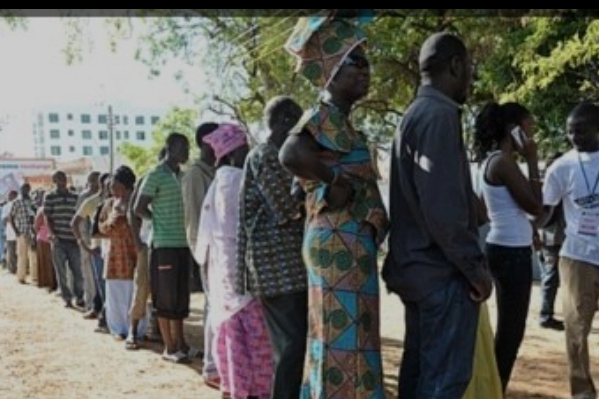
As Nigerians, we must remember our identity as a nation and unite ourselves through ideas, not through empty oratory. We must defend what our scriptures call on us all as believers: being fair and just. Let this be a reminder for everyone – we cannot let political trickery win over the truth. Nigeria must unite its citizens for the desired levels of progress and development. History will not dignify us if we refuse to stand firm to preserve that legacy.
Conclusively, Nigerians must not ignore or take lightly this alarming ploy to subvert our traditional voting culture by people who would rather substitute competence with an ethnoreligious sentiment. Therefore, the Nigerian choice of a leader in future elections must be based on just criteria instead of personal gain or agenda.
Read Also: POLITICS OF REDESIGNING NIGERIA CURRENCY
This blog post seeks to call on Nigerians to prioritize the use of knowledge and rationality when electing future government officials so that ethnoreligious sentiment does not interfere with the decisions they make while in office. We must all come together to fight against any form of discrimination which might arise from religion or ethnicity for our desired level of progress and development to be achieved. Let’s therefore take action now by sharing this blog post to educate electorates on the danger of unifying around ethnic and religious differences in making our choice of leaders in the future Nigerian presidential elections.
Further Research Questions.
1-How can appeal to religious and ethnic identity affect national unity in a multicultural society?
2- Why did the influence of ethnoreligious sentiment on political campaigning not lead to victory in the polls?
3- How does ethnoreligious solidarity affect a candidate’s ability to deliver on their promises?
4- How can religious clerics use their spiritual authority to strengthen national unity and promote the democratic idea
Link here for Visual Analysis of 2023 Presidential Election Result In Nigeria
Idowu E. Faleye, a certified Data Analyst, Political Activist, and writer, is a graduate of Politics & Public Administration. He’s the Founder/Chief Data Officer at EphraimHill Data Blog –a Data Reporting Site that is niche in Politics & Society. He can be reached at +2348132100608. or ephraimhill01@gmail.com



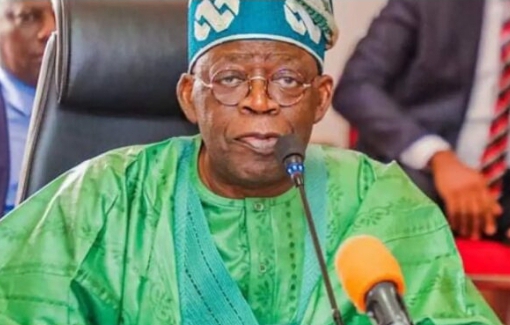








































![The Trend of Insecurity in Nigeria. [Part 2]](https://ephraimhilldc.com/wp-content/uploads/2024/09/Computer-Monitoring-of-Remote-areas.png)
































